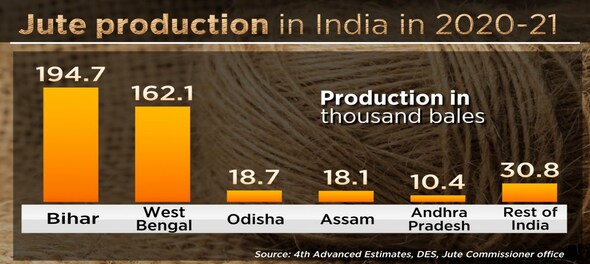Jute, this time, has become a catalyst of politics in West Bengal. The government on Thursday announced a withdrawal of the Rs 6,500 per quintal price cap on jute implemented around six months ago.
Bharatiya Janata Party (BJP) sources told CNBC-TV18 that this action had been taken to retain Arjun Singh, the vice-president of BJP West Bengal, in the party. Two days ago, after a meeting, BJP president JP Nadda told reporters Singh's place in the party would be clear in the coming 15 days.
The price cap on jute was increasing the proximity between Arjun Singh and his former party Trinamool Congress (TMC), and there were murmurs about his "ghar wapsi".
It all started when the government implemented a minimum fixed price of Rs 6,500 per quintal of raw jute last September.
Arjun Singh, who is a Lok Sabha MP from Barrackpur which is the jute belt of West Bengal, opposed that in Parliament. At the time, he said a fixed price would affect mill workers and small enterprises. Political experts, however, said the cap would hit Singh’s vote bank.
Opposing
the price cap, Singh even wrote a letter to textile minister Piyush Goyal, saying if nothing was done in seven days, he would start an aggressive protest. Goyal heard his demands and
directed him to meet the textile secretary, giving him an assurance that the problem would be solved.
But the meeting failed to pacify Singh. He said though he was happy that initiatives were being taken, he would not be satisfied with a “lollypop” and wanted to see some action, not just words.
Singh also
wrote to West Bengal Chief Minister Mamata Banerjee for intervention, including sending similar letters to
Bihar,
Odhisha,
Tripura and
Assam CMs. Amidst all this, Singh skipped the party’s Vijay Sankalp Yatra, which added fuel to the speculation of his return to TMC.
Following Singh’s demand, a tripartite meeting was held on May 9, including representatives of the jute ministry. There, Bengal's labour secretary opposed the idea of the maximum price on products like jute. Moreover, they demanded 100 percent reservation on the packaging of food grain in jute bags.
The ministries were told that the price cap on jute had the maximum effect on West Bengal as about a dozen mills had to shut, and more than 60,000 workers went out of work.
Jute experts told CNBC-TV18 that the moment the price cap was set, an artificial demand was created in the market. No one was ready to sell jute at this price, and, therefore, an artificial crisis was generated that led to the closure of 14 jute mills, they said.
In the meantime, the TMC trade union took up the issue. And Singh supported them.
Indian Jute Mills Association (IJMA) also requested the jute commissioner to revise the price cap to Rs 7,200, to which the commissioner did not agree. IJMA went to court, and the court asked the commissioner how this demand could be fulfilled.
Singh, too, was constantly mounting pressure on his own leadership. He was called a second time by Goyal and assured that his demand would be met. Nadda, too, called Singh. And as per the sources, there Singh hinted that if the price cap was not removed, he might jump back to TMC.
Within two days of this meeting, the maximum price was withdrawn. Singh called Goyal to thank him and also tweeted.
Member of Parliament for Hooghly, Locket Chatterjee, too, tweeted and thanked the ministry. TMC, too, stated it was their movement as per a tweet by Ritabrata Banerjee, who is the state in charge of the Indian National Trinamool Trade Union Congress.
First Published: May 20, 2022 12:30 PM IST




